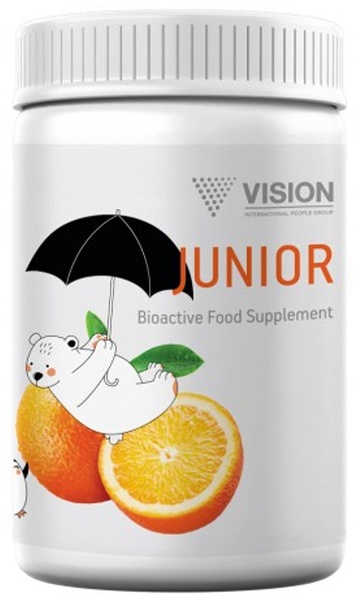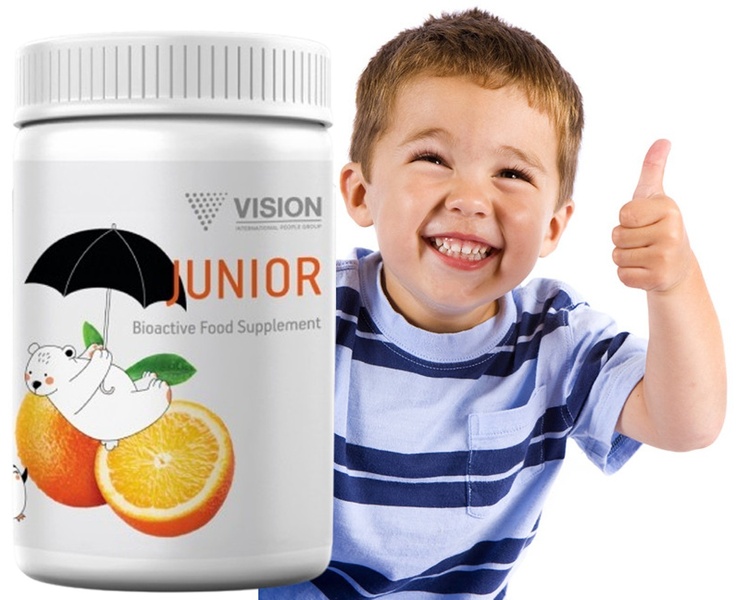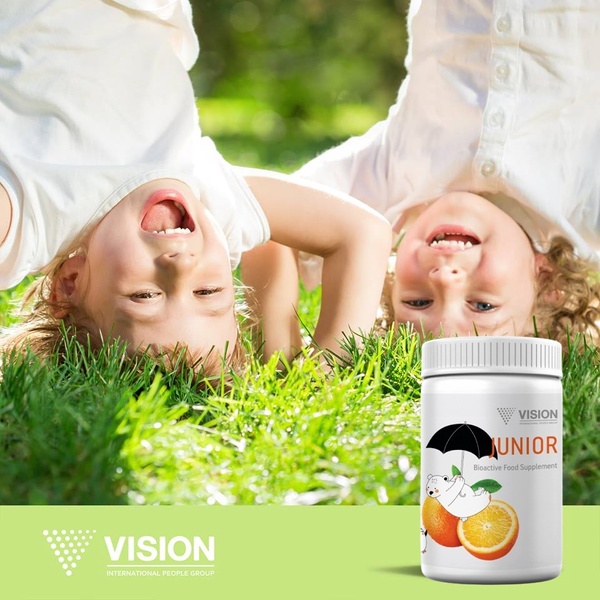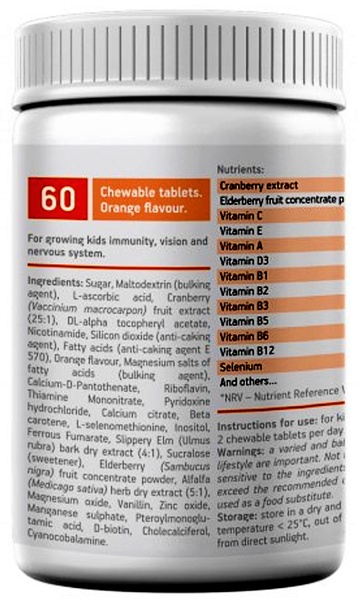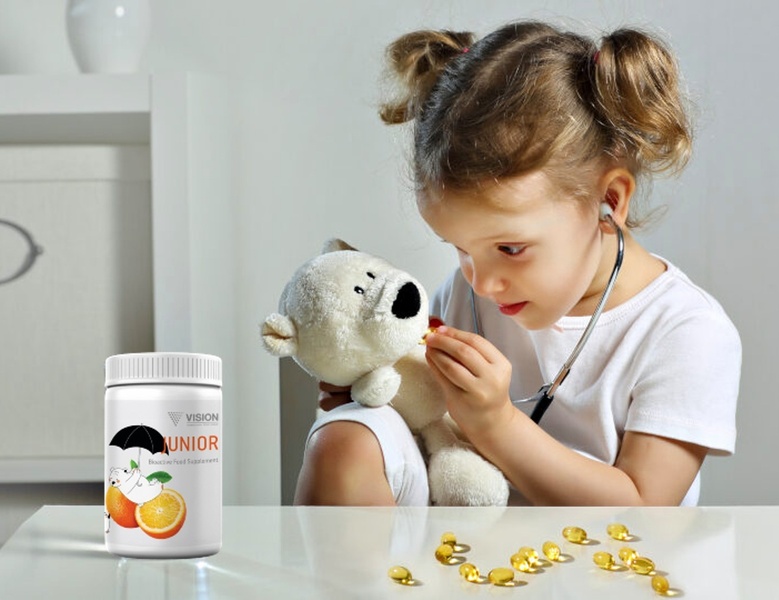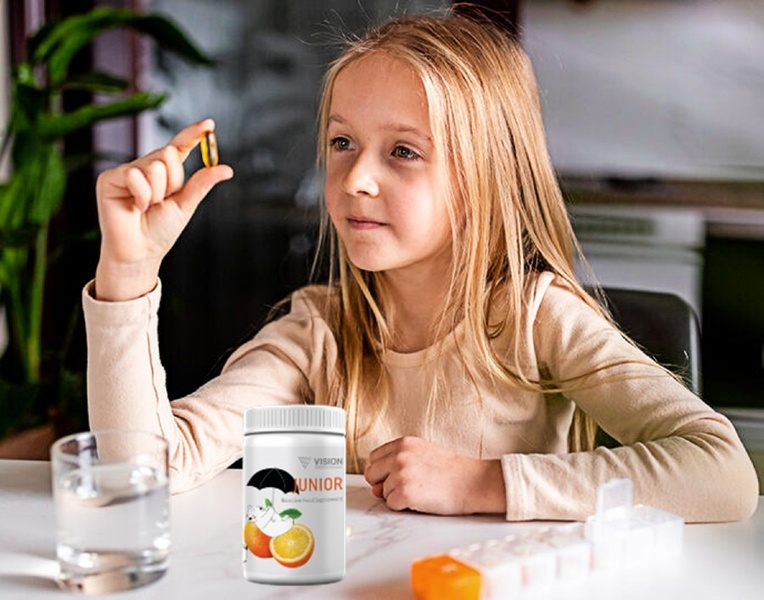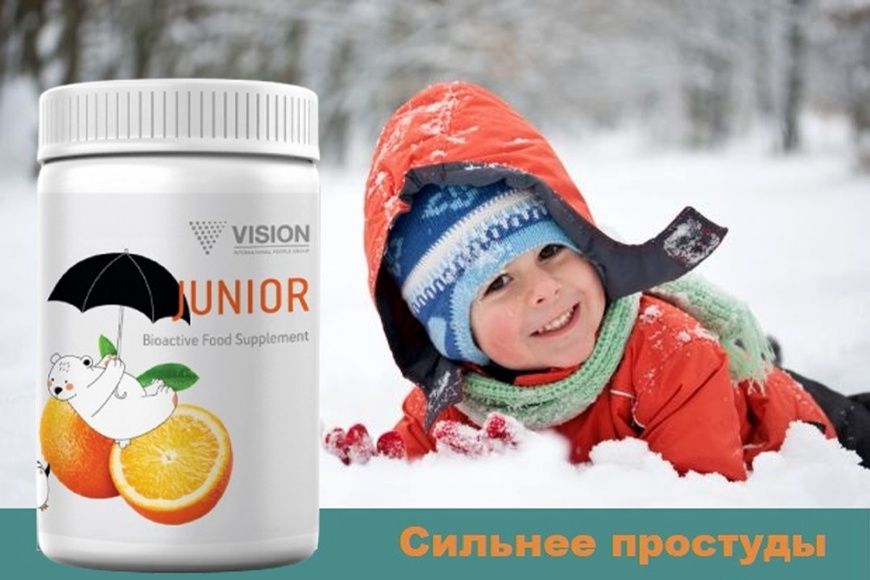|
Quantity
|
Out of stock
|
||
|
|
|||
JUNIOR VISION contains a «golden» set of vitamins and minerals essential for children's bodies. It provides the child with all macro- and microelements necessary for strengthening children's immunity, healthy growth, improved vision and support for the nervous system.
Acting at the cellular level, the active components of the JUNIOR VISION complex cover all the systems of the child's body, ensuring the all-round development of the child during the period of active growth. Their continuous work allows the child to develop normally.
Vitamins JUNIOR VISION make the nervous system of the child more stable, increase cognitive and motor activity, prevent fatigue and overexcitement. Increase the body's defenses to various infectious and cold diseases, contribute to the formation and maintenance of good health. Improve vision and memory, strengthen bone and normalize the nervous system, improve blood circulation, stimulate metabolic processes, have antimicrobial properties.
Universal, natural complex for children JUNIOR VISION is specially created with your child's health in mind.
Biotin, vitamins B1, B2, B3 (PP), B6, B12, C — contribute to the normal functioning of the nervous system, mental processes during heavy loads at school and normal energy metabolism.
Vitamin B1 is involved in the transmission of nerve impulses, and vitamin B6 contributes to the formation of serotonin (the hormone of happiness), which increases cognitive and motor activity, and improves the mood of the child. Vitamin B6 is also involved in regulating children's behavior as it helps in the formation of nerve endings.
Folic acid is necessary for the growth and development of the circulatory and immune systems, for the creation and maintenance of new cells in a healthy state, so its presence is especially important during periods of rapid development of the body in early childhood. Regulates the processes of excitation and inhibition of the nervous system, mitigates the effects of stressful situations.
Magnesium helps to normalize such an unstable and sensitive children's sleep, and also has a calming effect on the excited nervous system.
Vitamins C and E protect nerve cells in the brain and prevent fatigue and irritability, which are common in children.
Vitamins A, C, D3, B6, B12, Selenium — contribute to the normal function of the immune system.
Vitamins C, E, B2, Selenium — help protect cells from oxidative stress.
Vitamins A, B2 — help maintain normal vision and also contribute to normal retinal function. Eyes also need vitamin C, because without it the body cannot provide antioxidant protection to the organ of vision.
Biotin, folic acid, vitamins B1, B3 (PP), B12 — contribute to normal psychological function.
Calcium is very important for the formation of bones, cartilage, joints and ligaments, teeth, nails and hair. The immune and nervous systems depend on it. The mineral is necessary for the normal functioning of sensory systems (vision and hearing), blood clotting process.
Vitamin D3 — helps maintain normal muscle function. Provides optimal calcium absorption for the formation of healthy bones and teeth.
Manganese is important for bone and connective tissue formation.
Zinc, iron, and magnesium help activate cellular defenses and are key macro and micronutrients for improved memory. In addition, iron is essential for blood health and preventing anemia.
Inositol (Vitamin B8) is found and used in large quantities in the tissues of the nervous system and the lens of the eye. Stimulates brain activity, improves concentration, increases its ability to remember information, which is very important for teenagers who study. Has a calming effect, normalises sleep. Controls the production of dopamine and serotonin, prevents the development of depressive disorders.
Vanillin — flavoring, contains a natural complex of antioxidants. The main usefulness of this product is in the calming effect on the body, relaxation, relieving irritation, effectively counteracting insomnia, anxiety, restlessness and anger. It stimulates creativity and brain function. Vanillin is an antidepressant and antioxidant.
Selenium enhances the effects of vitamin C and vitamin E. They are responsible for healthy skin, full growth and development of the child, protection against cold infections. Without selenium, children's bones become brittle, growth and weight gain slow down.
Cranberry extract is known for its high content of vitamin C, antioxidants and flavonoids that help support the immune system. Prevents the development of avitaminosis. Slows down the development of tooth decay. Improves visual acuity. Increases physical endurance and mental performance.
Elderberry fruit concentrate effectively fights viruses, including influenza viruses, reducing the duration and severity of symptoms of the disease. Calms the nervous system. Strengthens the immune system. Normalises the activity of the digestive tract.
Slippery elm bark extract improves intestinal peristalsis, helps to quickly get rid of coughing in bronchitis, asthma and other respiratory diseases. Promotes cleansing of the digestive system. Strengthens the immune system. Has a calming effect.
Alfalfa herb extract strengthens the circulatory system and reduces sugar levels. Also, alfalfa is rich in plant fluoride, which prevents tooth decay. It improves eyesight, boosts immunity and has a tonic effect. It is used as an anti-inflammatory agent. Strengthens hair.
Properties of vitamins JUNIOR VISION:
- During the period of active growth provide children's bodies with a full range of essential vitamins, micro- and macronutrients.
- Necessary to prevent vision problems.
- Effective during the period of adaptation to kindergarten and school.
- Positively affect the stability of the nervous system of the child.
- Increase the concentration of attention and improve memory.
- Provide full absorption of calcium, which contributes to the strengthening of bones and teeth.
- Prevent delays in growth and development of the child.
- Prevent tooth decay.
- Strengthen the immune system.
- Increase hemoglobin.
- Support the digestive system.
- Increase motor and cognitive activity.
- Have a tonic effect.
- Reduce the risk of autoimmune diseases.
- Have an antioxidant effect.
- Increase the body's resistance to colds and infectious diseases.
- Effective in stuttering and enuresis.
- Meet the needs of the growing body in the harmonious development.
- Do not allow overwork and overstimulation.
- Help normalize metabolism and appetite in children.
- They are used after surgery, with mental and physical exertion, during sports, with sleep disorders.
- Prevention and treatment of anemia, acute and chronic respiratory diseases, gastrointestinal tract (including dysbacteriosis), infectious diseases, endocrine pathology (diabetes mellitus), skin diseases, allergies, diathesis, pathology of the nervous system.
- Recommended for pregnant women (in increased dosage), nursing mothers; elderly people.
Recommended as a dietary food supplement — a source of bioflavonoids, anthocyanins, amino acids, organic acids, catechins, glycosides, an additional source of vitamins C, E, A, D3, B1, B2, B3 (PP), B5 (pantothenic acid), B6, B7 (D-Biotin), B8 (inositol), B9 (folic acid), B12 and minerals: calcium, magnesium, iron, zinc, manganese and selenium.
*Biological supplements are not a substitute for a balanced and rational diet.
*Not a medicinal product.
CRANBERRY EXTRACT is rich in useful trace elements — calcium, magnesium, iron, phosphorus, zinc, manganese, molybdenum and copper. Pectins, flavonoids, betaine, phenolic acids, anthocyanins, leucoanthocyanins and catechins are found in cranberries. Cranberries contain high amounts of vitamin C, as well as B vitamins (B1, B2, B5, B6), vitamins A, K and E. Cranberry extract prevents the development of avitaminosis. Slows the development of tooth decay. Improves visual acuity. Increases physical endurance and mental performance. Vitamins and antioxidants contained in cranberries, contribute to the overall immunity of the body of children. Cranberries increase the defences of the child during colds (acute respiratory infections, acute respiratory viral infections, influenza, adenovirus infection). Saturating his body with vitamins and minerals, helps to maintain strength and good health, reduces intoxication of the child's body. Cranberries contain a large amount of pectin, so it can contribute to the natural excretion of poisons, radioactive substances and heavy metal ions from the body, so it is especially useful for children living in cities, large industrial centres, regions with adverse environmental conditions. Pectin is also important for improving intestinal peristalsis. It increases the secretory capacity of the stomach and pancreas, promotes the multiplication of beneficial microorganisms in the intestine, has anti-inflammatory and enveloping effect, so its use in the treatment of dysbacteriosis in children is justified. Cranberries contain a large number of anthocyanidins, flavanoids and other antioxidants. They help fight oxidative stress, which can lead to cell damage and cause various diseases. Today, cranberry extract is widely used for the production of special food supplements, the effect of which is aimed at improving immunity, reducing inflammation and preventing many serious diseases, including cancer.
BLACK ELDERBERRY FRUIT contain ascorbic and malic acids, rutin, carotene. Includes a large number of vitamins A, C, B1, B2, B3 (PP), B5, B6 and B9, as well as minerals: calcium, potassium, iron, magnesium, phosphorus, sodium, zinc, copper and selenium. Of particular importance are flavonoids and anthocyanins, which are powerful antioxidants, sambucin, tannins, amino acids, organic acids, resins, pectins, glycoside sambunigrin. Black elderberry normalises the adrenal cortex, helps with skin pigmentation disorders, conjunctivitis, skin diseases and depression. Thanks to vitamin C and anthocyanins, black elderberry increases immunity and activates the body's defences against viral infections, particularly influenza virus, reducing the duration and severity of symptoms of the disease. The anti-inflammatory properties of elderberries help reduce inflammation in the body. In addition to its antioxidant and antiviral properties, black elderberry contributes to the overall strengthening of the body. Elderberry extract stimulates the production of cytokines, proteins that play a key role in the body's immune response. This makes elderberry a valuable component in a variety of dietary supplements and natural medicines. Elderberries help digestion, stimulate the production of gastric juice, reduce acidity, have a biliary and diuretic effect, accelerate metabolism. In addition, elderberries have antihelminthic properties, have an excellent effect on vision, serve as a good prevention of cataracts. Elderberry is an effective prevention of atherosclerosis, insomnia and frequent headaches, calms the nervous system!
SLIPPERY ELM BARK EXTRACT is rich in antioxidants and antimicrobial agents. It contains vitamins (B, A, C, K), minerals (calcium, magnesium, phosphorus), as well as tannins, catechins, bioflavonoids, polysaccharides, fibres, triterpenoids. The antioxidants in slippery elm strengthen the immune system. Elm bark is used in the treatment of intestinal diseases that are associated with inflammatory processes. It aids in digestion, helps in maintaining a healthy stomach pH and cleansing the digestive system. It helps with allergic reactions from the gastrointestinal tract. Effective in constipation, diarrhoea, flatulence and other GI disorders. The soluble fibre of slippery elm acts as a prebiotic, which nourishes beneficial intestinal bacteria. Through a natural fermentation process, the soluble fibre is broken down, nourishing and stimulating the growth of these essential probiotic bacteria. In turn, these bacteria aid digestion and are vital to the immune system. When dust, environmental pollutants, household chemicals, pollen and other allergens enter the respiratory system, the inflammatory process begins. It is accompanied by swelling of the nasopharynx, coughing fits, runny nose. The use of elm bark alleviates the symptoms of chronic, acute and seasonal allergies. Promotes rapid relief from coughing in bronchitis, asthma and other respiratory diseases.
ALFALFA HERB EXTRACT contains a large amount of chlorophyll, proteins and all amino acids, B vitamins, vitamins A, C, PP, D, E, K, macronutrients (potassium, calcium, magnesium, phosphorus), trace elements (iron, manganese, copper, zinc, fluorine, cobalt, sodium, silicon), carbohydrates, alkaloids, saponins, tocopherols, organic acids, flavonoids, as well as a number of proteolytic enzymes that break down proteins and promote their digestion. The healing properties of alfalfa from ancient times are used in folk medicine: for loss of strength, reduced efficiency and fatigue. Alfalfa is a natural diuretic and antipyretic. Alfalfa saponins bind cholesterol and block its absorption, thereby reducing the level of «bad» cholesterol in the blood. Also steroidal saponins in alfalfa have an effect on the body similar to the adrenal hormones, namely increase their activity, thereby increasing the stress resistance of the child. B vitamins are essential for the nervous system and can neutralise the effects of stress and depression. They are responsible for brain activity and ensure mental alertness. Besides the «anti-stress effect» the extract, being a mixture of protein and B vitamins, is a natural energiser that boosts immunity. Alfalfa extract can easily deal with purulent inflammations and fungal diseases. Due to the presence of the non-protein amino acid L-canaverine, the extract has properties that inhibit the proliferation of viruses such as herpes simplex virus. Alfalfa contains fluoride, which strengthens tooth enamel, protects against tooth decay and the development of unwanted microflora in the oral cavity. Alfalfa has been found to contain a large amount of chlorophyll, which contributes to the process of cleansing the body, acts as a barrier against bacterial infections, perfectly cleans blood vessels and promotes their elasticity. Flavonoids are powerful antioxidants that fight inflammation, pain syndromes and prevent viral infections. Thanks to vitamin C, alfalfa extract acts as a powerful antioxidant, increasing the body's defence functions. Vitamin E promotes metabolic processes, accelerating cell regeneration.
BIOFLAVONOIDS (another name — Vitamin P) — the most numerous group of plant polyphenols, combining a number of biologically active substances, namely hesperidin, rutin and quercetin. They are an effective preventive agent: have an antioxidant effect, reduce blood clotting, reduce the fragility and permeability of capillaries, improve fat metabolism. Only plants produce flavonoids, so these substances are practically absent in products of animal origin. Bioflavonoids do not accumulate in the body and should therefore be taken daily with food. They can change the body's response to allergens, carcinogens and viruses. This is evidenced by the antiviral, anti-inflammatory, anti-tumour and anti-allergic properties of flavonoids. In addition, bioflavonoids can normalise the immune system, slow down inflammatory processes and prevent the proliferation of cancer cells. Vitamin C together with vitamin P regulate the formation of collagen — the main element that helps to strengthen blood vessels and improve the condition of connective tissue tendons, ligaments, bones, cartilage, nails, hair, skin. Bioflavonoids also reduce oedema, normalise blood pressure and dilate blood vessels. However, in search of flavonoids, it makes sense for a modern person to turn not only to natural products, but also to biologically active supplements. In fact, neither chocolate nor fruit can provide children's bodies with a really sufficient amount of flavonoids. To combat this problem, specialists all over the world use dietary supplements as sources of flavonoids.
VITAMIN C supports healthy skin, blood vessels, bones and cartilage, helps in wound healing and strengthens muscles. European scientists have shown that vitamin C supplementation can reduce the frequency and duration of respiratory infections, so vitamin C for children may be useful in preventing frequent acute respiratory infections. Vitamin C also helps the body absorb another important micronutrient, iron. Iron carries oxygen throughout the body so that cells can produce energy. Vitamin C is also involved in the production of collagen, a protein that helps your child's body build healthy ligaments and tendons, bones and teeth. Collagen is also important for the skin. Vitamin C deficiency increases the risk of colds, blood cholesterol levels, seborrhoea, fatigue, irritability, drowsiness, loss of appetite and bruising. Another manifestation of vitamin C deficiency is bleeding gums. Children may develop joint inflammation or joint pain. Because vitamin C helps the body absorb iron, iron deficiency usually results in vitamin C deficiency. The body does not store vitamin C, so children should take daily ascorbic acid supplements.
FERROUS FUMARATE — is an organic form of iron that is easily absorbed by the body and does not cause undesirable side effects. Ferrous Fumarate is used as a medicine to treat and prevent iron deficiency anaemia. Iron enters the body only with food, absorbed little (15-35% from meat products and 2-20% from vegetable products), and even competes for absorption with other minerals! Iron is especially necessary during the period of rapid growth of the child: it is involved in hematopoiesis and oxygen supply to cells, in the synthesis of immune cells, the formation of growing tissues, cholesterol metabolism, liver cleansing. If iron from food is not enough to meet the needs of the growing organism, or the absorption of iron in the child for some reason disturbed — iron deficiency occurs in the body. The «risk group» includes adolescent girls after the onset of menstruation. Iron plays an important role in the development of the child's intelligence, physical growth and proper functioning of the nervous system. Therefore, providing the child's body with sufficient iron is of paramount importance. Due to the 70 valuable enzymes contained in iron, this trace element has a powerful healing effect on the functioning of all systems and organs of the child's body. Iron deficiency in a child's body can cause delayed growth and development, reduce performance and school achievement, increase the frequency of acute respiratory diseases, and cause appetite perversion. According to WHO, daily iron supplements for children aged 5-12 years reduce the risk of iron deficiency and anaemia.
VITAMIN E is essential for the proper functioning of many organs of the body. It plays a central role in the child's immune system and acts as an antioxidant, neutralising free radicals that damage cells at the genetic level. Vitamin E is vital for children from birth. Its deficiency seriously affects the development and condition of the immune system, the most important protein haemoglobin in the blood, the lack of which leads to anaemia. In addition, deficiency of the vitamin leads to a decrease in mental activity, failures and delays in the development of the sexual system in adolescence. Vitamin E can improve the nutrition of skin and hair, reduce their dryness, strengthen nails. Vitamin E also regulates energy metabolism in the muscles, helping to accumulate energy reserves — glycogen. It improves the nervous system and strengthens the immune system. It also promotes the absorption of nutrients, including vitamin D, and protects vitamin A from being destroyed in the body. This is why vitamins A and E are called partners. Vitamins C and E prevent fatigue and overexcitement, which are so characteristic of children, improve memory. As a typical manifestation of tocopherol deficiency, the following can be observed: weakening of the muscular system; mental and emotional instability; delayed intellectual and physical development in children; deterioration of the visual organs; premature aging of the skin.
VITAMIN A is responsible for stem cell distribution, body growth, immune system strength, and quality of vision. It stimulates cell growth, prevents cataracts, and accelerates tissue regeneration. Vitamin A also fulfils a protective function — it reduces the negative effects of ultraviolet radiation, which reduces the risk of sunburn, and in addition has a cosmetic effect on the skin. Vitamin A has a multifaceted effect on the body: it improves the intestines, liver, kidneys, supports the organs of vision, removes toxins, has antibacterial, antiviral properties. Vitamin A is a substance that allows you to improve vision. Its antioxidant properties are involved in protecting the eyes from the effects of free radicals. It ensures stable activity of the visual analyser, participates in the synthesis of retinal pigment and the process of perception of light by the eye. Vitamin A is especially useful during cold and flu season. It strengthens the immune system against invading bacteria, viruses and fungi. Vitamin A deficiency first of all negatively affects the appearance of the child — acne appears, and the skin becomes dry and flaky. In addition, nails and hair suffer. The former begin to break, and the latter become more sparse and can fall out even at an early age. The following symptoms may also be observed: the sensitivity of tooth enamel increases; growth retardation is observed; the quality of vision decreases; the immune system deteriorates, and viral infections can enter the body almost unhindered.
VITAMIN D3 is extremely important for the maintenance of full metabolism of calcium and phosphorus and, consequently, for normal bone growth, muscle function, nervous system and haemostasis. Severe deficiency of this nutrient in infancy and childhood causes rickets, a disease in which bone mineralisation is impaired. This condition is particularly dangerous for fast-growing bones, as the growth plates continue to increase with age, but inadequate mineralisation leads to curvature of weight-bearing limbs (both legs and arms). According to various studies, more than half of humanity is vitamin D deficient. Rakhitis, dermatitis, weakened immunity, mental retardation, allergic reactions, cardiovascular diseases and even cancer — this is not a complete list of conditions to which vitamin D deficiency leads. Vitamin D supplementation has been shown to reduce the risk of acute respiratory infections. Severe vitamin D deficiency can lead to hypocalcaemia (a decrease in blood calcium levels), which can lead to seizures. Although many countries add this nutrient to various foods, deficiency in children is still a serious problem. Vitamin D3, together with other vitamins, strengthens immunity and is an excellent means of preventing colds of all kinds.
B VITAMINS make the child's nervous system more stable, increase cognitive and motor activity. They trigger fat and carbohydrate metabolism, which is beneficial for muscles, vision, digestion, liver and nervous system, as well as skin and hair growth. Improve the body's defences and promote antibody production. Help your child's body convert food into energy, which is necessary for the digestive system to function properly. Contribute to maintaining a good night's sleep. Each B vitamin plays an individual, unique role in the body.But as a group, they are best known for helping the body release the energy it needs to function properly from nutrients such as carbohydrates, fats, and proteins. Plus, B vitamins also help reduce stress levels. Signs of B vitamin deficiency (depending on which B vitamin is deficient): anaemia; brittle hair and nails; cardiovascular symptoms; depression; difficulty concentrating; fatigue; hair loss; irritability; nervousness; short-term memory loss; skin disorders; stomach upset; weight loss.
VITAMIN B1 is the most important vitamin in the energy metabolism of children. It is thanks to vitamin B1 that a child gets maximum energy for playing, learning and development. It helps improve brain function, memory, attention, thinking, normalises mood, improves learning ability, stimulates bone and muscle growth, normalises appetite, maintains muscle tone in the digestive tract, eliminates «seasickness» and relieves motion sickness, maintains tone and normal functioning of the heart muscle, reduces toothache. Vitamin B1 deficiency is manifested by the following symptoms: increased fatigue; irritability; depression; insomnia or restless sleep; impaired memory; loss of concentration; impaired appetite; diarrhoea or hypotonic constipation; nausea; headaches; impaired coordination of movement; muscle weakness; shortness of breath, at the slightest physical exertion.
VITAMIN B2 is mainly needed to ensure normal metabolism of fats and carbohydrates, functioning of the nervous system, muscles, including heart muscle, vision, skin, mucous membranes, nails and hair. Riboflavin is often prescribed in the treatment of eye diseases, such as dystrophic changes in the retina, because riboflavin in the form of coenzymes is involved in redox reactions and helps to increase colour receptivity of the visual analyser and dark adaptation. The functions of vitamin B2 make it a serious helper in the fight against skin diseases, poorly healing wounds, anaemia. Due to the deficiency of the vitamin reduces the activity of the bone marrow and iron metabolism is disturbed. And violation of the processes of synthesis of haemoglobin — a direct path to anemia. Riboflavin is also an antioxidant and helps the body convert vitamin B6 and folic acid into active forms, which is important for growth and production of red blood cells. Vitamin B2 deficiency leads to inflammation of the skin (seborrhoeic dermatitis) and mucous membranes (chapped lips and corners of the mouth, reddish tongue), to visual disturbances (lacrimation, increased sensitivity to light).
VITAMIN B3 (Niacin, Vitamin PP) is necessary for children's organism to convert carbohydrates and fats into energy. It has a beneficial effect on brain function — memory, concentration, thinking. Niacin is necessary for the brain as calcium is for the bones — without it, memory cannot function properly, the child loses the ability to associate, cannot sleep. Normal vision — also the merit of vitamin B3. It helps maintain healthy skin, benefits hair and stimulates blood circulation in the hair roots. Vitamin PP takes part in the breakdown and further synthesis of amino acids, carbohydrates, fatty acids, it also regulates cholesterol levels, so the deficiency of the element is dangerous for the body. It effectively contributes to the functioning of the nervous system, in the production of sex hormones, as well as red blood cells. Symptoms of vitamin B3 deficiency: decreased appetite, nausea, weakness, insomnia, peeling skin on the face, hands, cracks on the mucous membranes of the mouth, skin.
VITAMIN B5 (Pantothenic acid) is converted into pantethine, which is part of coenzyme A, which plays an important role in oxidation and acetylation processes. Coenzyme A is one of the few substances in the body involved in the metabolism of proteins, fats and carbohydrates. Vitamin B5 is necessary for the synthesis of vital fatty acids, cholesterol, histamine, acetylcholine, and haemoglobin. A number of foreign studies indicate the important role of vitamin B5 in the cardiovascular system and metabolic regulation, which is especially relevant in the selection of vitamins for adolescents. Deficiency of pantothenic acid in the body leads to metabolic disorders, on the basis of which develop dermatitis, depigmentation and hair loss, cessation of growth, exhaustion, changes in the adrenal glands and nervous system, as well as disorders of coordination of movements, heart and kidney functions, stomach and intestines.
VITAMIN B6 is important for the proper growth and development of children. It is involved in energy production, brain development, immune function, protein metabolism and red blood cell formation. It is essential for the normal functioning of the central and peripheral nervous system. This element is involved in the production of «happy hormones», which are responsible for sound sleep, good mood and appetite. To all vitamin B6 is a conductor of magnesium into the cells. And magnesium helps retain calcium in new bone cells. That is, the presence of a proper amount of vitamin B6 is essential for the child's body in general, and his bone system in particular. It also takes part in the fight against infections, supporting the immune system of your child. It ensures the metabolism of amino acids and strengthens the body's defence functions. In addition, it takes part in the production of blood cells and haemoglobin, and regulates hormone levels. Vitamin B6 deficiency in children is manifested by weakness and fatigue, can lead to anaemia. Growth and development is also disturbed, skin rashes, irritation, acne, boils appear. Children may have frequent mood changes and become irritable. Signs of deficiency may also include dryness and hair loss, nausea, decreased appetite, conjunctivitis, insomnia and stomatitis.
VITAMIN B7 (D-Biotin) plays a vital role in helping enzymes break down fats, carbohydrates and proteins in food. The D-Biotin form is the only one of the eight forms of biotin that is fully biologically active! It is a source of sulphur, essential for collagen synthesis, and is involved in CO2 activation and transport reactions. Biotin is essential for the nervous system and healthy intestinal microflora, and is also important for healthy hair, nails and skin, which is why it is called the «beauty vitamin». Biotin promotes the health of sweat glands, nerve tissue and bone marrow. It also contributes to the relief of muscle aches and pains. Biotin deficiency can lead to the development of dermatitis, brittle and hair loss, thinning and deformed nails, decreased muscle and vascular tone, inhibition of development and growth, as well as the development of certain mental illnesses. Vitamin B7 deficiency can cause metabolic disorders.
VITAMIN B8 (Inositol) is one of the most important B vitamins. It is found and used in large quantities in the tissues of the nervous system, the lens of the eye, tear and seminal fluid. Inositol stimulates brain activity, improves concentration, stimulates mental activity, reduces brain fatigue, increases its ability to remember information. Vitamin B8 participates in the metabolism of fats in the body, improves the transmission of nerve impulses, helps maintain a healthy liver, skin and hair. Inositol reduces cholesterol in the blood, prevents fragility of blood vessel walls, regulates the motor activity of the stomach and intestines. It has a calming effect, helps in the conduction of nerve impulses. Controls the production of dopamine and serotonin, prevents the development of depressive disorders. Has pronounced antioxidant properties. Helps fight the action of free radicals in the brain, bloodstream and other tissues of our body. Vitamin B8 supplements can be used in psychiatry, as an alternative to synthetic antidepressants. The first signs of inositol deficiency: sleep disorders, insomnia; nervousness, unreasonable aggression, tearfulness, distractedness; hair loss, brittleness and dryness; deterioration of vision, eye diseases; dermatitis of various types, deterioration of the skin, dryness; increase in «bad» cholesterol; disorders of the cardiovascular and digestive system; weakness, muscular dystrophy; abnormalities in the nervous system. Deficiency of the substance is accompanied by relaxation of the smooth muscles of the intestine. Peristalsis is disturbed, the risk of constipation and the formation of coprolites increases.
FOLIC ACID (Pteroylmonoglutamic acid, Vitamin B9) is actively involved in DNA and RNA synthesis, red blood cell formation and is crucial during periods of rapid growth of the child's organism. Folic acid is necessary for the creation and maintenance of new cells, so its presence is especially important during periods of rapid development of the organism — at the stage of early intrauterine development and early childhood. Vitamin B9 affects the growth and development of all tissues, adjusts the immune system, supports the cardiovascular system. It is also involved in the synthesis of amino acids and enzymes. It has a beneficial effect on the hematopoietic system and the functionality of white blood cells, on the health of the liver and on the digestive system as a whole. In addition, folic acid regulates the processes of excitation and inhibition of the nervous system, mitigates the effects of stressful situations. Signs of folic acid deficiency: depressed restlessness; feelings of fear; memory problems; digestive problems; oral stomatitis; anaemia; decreased activity of the child; irritability and aggression; skin diseases; hair loss. In addition, over time, B9 deficiency can lead to central nervous system dysfunction, up to and including retarded thinking.
VITAMIN B12 plays an important role in the functioning of the nervous system. It is involved in the formation of myelin sheaths of nerve fibres, which in turn protect the nerves and ensure proper conduction of nerve impulses. This kind of «insulation» of nerve fibres is important for both the peripheral and central nervous system. In addition, vitamin B12 is involved in the synthesis of neurotransmitters and hormones that control perception, mood and psyche. This vitamin contributes to the formation of red blood cells and DNA synthesis. It is essential for more than 100 body functions on a daily basis. With a prolonged deficiency of this biologically active substance, the child becomes lethargic, quickly tired, refuses to eat, worse remembers new things. Often, good blood circulation is associated with high iron levels, but in fact folic acid and vitamin B12 play the same role. That's why, they are called the blood forming vitamins. B12 helps in the division of red blood cells, which are essential for maintaining constant oxygen circulation in our body. Hence, it is actually the deficiency of B12 and folic acid that is often the cause of anaemia. Symptoms of vitamin B12 deficiency are usually fatigue, memory impairment, decreased concentration, poor mood and muscle weakness. Peripheral nerve malfunctions often cause symptoms in the lower extremities such as tingling, numbness, and soreness in the calf muscles.
SELENIUM is now classified as essential, i.e. indispensable and necessary for complete metabolism. In the composition of JUNIOR VISION children's vitamins, the organic, bioactive form of selenium, L-selenomethionine, is one of the most digestible and absorbable forms. It is a key link in the antioxidant system of the paediatric body. Enzymes that are linked to selenium protect body cells from free radicals, allergens, infectious agents. In this way protection against viruses and bacteria, fungi and parasites, tumour cells and allergies is realised. Antioxidants help protect cells from damage and death, support the activity of the immune system. Selenium is part of hormonal compounds, enzymes in blood plasma and in lymph and intercellular fluid. In addition to the effects already listed, the trace element enhances the effects of ascorbic acid (vitamin C) and tocopherol (vitamin E). They are responsible for the health of the skin, full growth and development of the child, protection against cold infections. Due to enzymes with selenium protect cell nuclei and DNA structures from damage, which prevents dangerous mutations. Together with manganese, selenium regulates cell division processes. Without selenium, children's bones become brittle, growth and weight gain slow down. In addition, the deficiency may disrupt the process of remembering information, its subsequent reproduction, as well as behaviour. Poor appetite in children is not uncommon. If the child in addition often appear pimples, pustular rashes, it is already a signal of disadvantage. Not only that — the child is quickly tired, often complaining that his «legs hurt». All these symptoms in combination may be signs of deficiency in the dietary intake of the trace element selenium. Deficiency of selenium is characterised by weakness, reduced body defences, anaemia, kidney and pancreas diseases. If the micronutrient is deficient, skeletal muscles, liver and heart muscles may suffer, skeletal growth is impaired and bones become more brittle.
MANGANESE — without it the normal functioning of the central nervous system is impossible. This useful trace element helps a person feel much stronger and calmer, not so quickly offended and agitated in awkward situations, under stress. Manganese controls the production of special substances — neurotransmitters, which are physiologically active. They are responsible for ensuring that nerve impulses are quickly transmitted from the fibres of nerve tissue to other fibres of the same kind. Manganese also helps in the normal development of the bone system. If manganese is present in the body in the right doses, bones grow and develop normally. Manganese is as essential for bones as calcium. The mineral helps cartilage to grow faster and become stronger — a feature that is particularly useful for children, teenagers and people who have suffered bone injuries. Manganese also actively helps fight cataracts, multiple retinal sclerosis and other eye diseases. The absorption of vitamins thanks to manganese is faster, especially vitamins of the B group, vitamin C, vitamin E. With manganese, new cells multiply and develop faster, wounds, scratches and other skin injuries heal faster. With manganese, the brain works faster and clearer and metabolism is faster. Signs of potential manganese deficiency include: decreased glucose sensitivity; growth problems in children; changes in carbohydrate and fat metabolism; chronic fatigue; and hormonal imbalances.
CALCIUM CITRATE is one of the most bioavailable forms of calcium. This means that it is easily absorbed and utilised by the body. Calcium is very important for the formation of bones, cartilage, joints and ligaments, teeth, nails and hair. The immune and nervous systems depend on it, the mineral is necessary for the normal functioning of the sensory systems (vision and hearing), the process of blood clotting. Calcium also regulates metabolism, muscle contraction and nerve impulse transmission. This mineral is important for people of all ages, but special attention should be paid to its level in children and the elderly. Calcium in a child's body is involved in more than 300 biologically important reactions. It forms healthy tooth tissue, both deciduous and molars — without it, there will be no strong tooth enamel and dentin. Calcium regulates heart rate and blood pressure. The mineral fuels nerve cells and relieves increased neuromuscular excitability. It helps lower bad cholesterol. Even a moderate lack of calcium in the body of a child can cause such problems as improper growth of milk or molars, stunted growth, sleepiness, increased fatigue, constipation. Lack of calcium in the body is manifested by increased excitability of the nervous system and attacks of painful seizures. To suspect a deficiency will help the following symptoms — general weakness, decreased academic performance, dry skin, brittle hair and nails, progressive lesions of teeth — caries and periodontitis, the feeling of crawling goosebumps in the fingers and hands and muscle twitching. In children, spinal curvatures, posture disorders, other bone deformities are noted. The child grows worse, in rare cases pathological fractures are formed.
ZINC is needed by children and adolescents for the normal development and formation of internal organs. Zinc is the most abundant metal in the human body after iron. The trace element activates over 200 enzymes used by the body for digestion and quality absorption of food. The role of zinc cannot be overestimated: it participates in metabolism, increases immune strength, and has strong antioxidant properties. Together with vitamin A and vitamin C, it prevents immunodeficiencies by stimulating antibody synthesis and antiviral action. Zinc, acting on pituitary hormones, activates their activity. Without it it is impossible to release vitamin A, which increases immunity, protects the eyes and improves the condition of the skin, in addition, zinc is involved in the formation of the skeleton and bones. Together with vitamins B6 and B9 normalises and regulates the regeneration of skin and mucous membranes. That is why this element should be present in sufficient quantities in the diet of both adults and children. It is also worth noting that this element accelerates the healing of wounds (and for children who regularly have scratches and bruises, it is extremely important), helps to normalise the gastrointestinal tract and even helps to fight various diseases and disorders of the nervous system. This natural trace element activates human immunity, favourably affects the condition of the teeth, eyes, improves memory. For the children's body it is also important because it contributes to the proper development and functioning of the reproductive organs. Lack of this important trace element can cause impaired growth and development of children, appetite, loss of full-fledged work of the skin as the main organ of defence.
MAGNESIUM — its action is very important for the functioning of the nervous system and muscles. They are the ones with the activity where magnesium regulates cell membranes for other metal ions. As a result, immunological processes in the body are maintained. Magnesium deficiency affects children's bodies particularly badly. The child's nervous system is less resistant to stresses that arise as a result of adaptation to kindergarten and during school. Magnesium is necessary for children to improve concentration, normalise emotional state and night sleep. It helps to reduce fatigue, eliminate problems with the heart and digestive organs, is used to prevent child neuroses. Magnesium takes part in the energy metabolism of cells, proper regulation of metabolic processes, to relieve excitability of the nervous system in children. Magnesium works together with calcium, it is the basis of the musculoskeletal system, and these elements must be in balance. Then the child will be active and develop properly. How can magnesium deficiency in adults and children manifest itself: increased fatigue; irritability, increased emotionality, tearfulness, crankiness; sleep disorders, poor sleep, restless sleep, nightmares; headaches, dizziness; decreased memory, attention; startle, nervous tics, muscle twitching, tremors (shaking of the hands, and in infants the hands and chin); cramps in the calf muscles, muscle pain when pulling; abdominal pain, constipation; heart pain, palpitations; increased blood pressure; acute reaction to changes in atmospheric pressure (meteosensitivity — feeling unwell when the weather changes), headaches, joint pain, etc. д. After reading this, most mums have found some of the above symptoms in themselves and their children of different ages, and in babies under a year some symptoms are very common. And most schoolchildren, especially at the end of the school year, have headaches, memory and attention loss.
VANILLIN is a flavouring that contains a natural complex of antioxidants. The main usefulness of this product lies in its soothing effect on the body, in relaxation, relieving irritation. Vanillin is able to eliminate anxiety, get rid of insomnia, tame outbursts of anger, lift your mood. It lowers blood pressure, adjusts metabolism, digestive processes, carries out antiseptic and anti-inflammatory action, stimulates creativity and brain function. Vanillin is an antidepressant, antioxidant and anticarcinogen (minimises the risk of malignant neoplasms). Another important advantage of vanilla is that it relieves cravings for sweets, increases metabolism. Vanillin promotes better sleep, rapid recovery in inflammatory and infectious diseases.
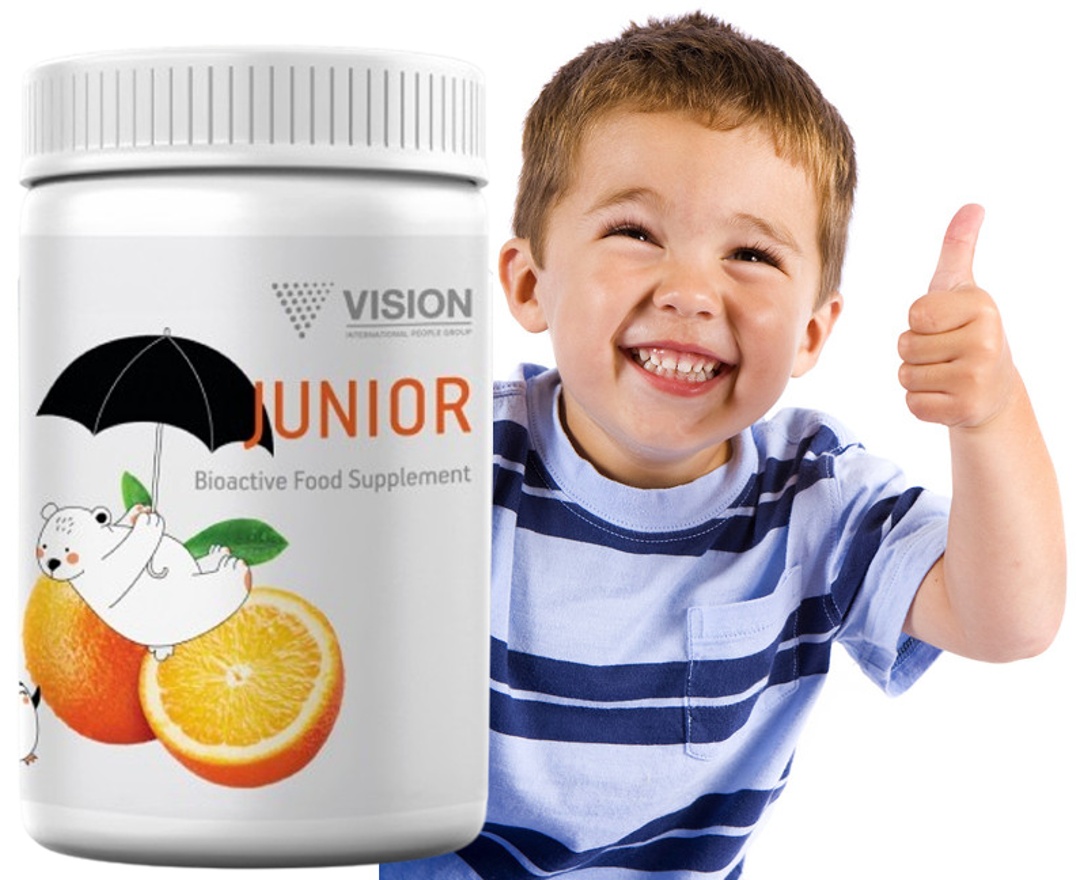
Who should take JUNIOR:
- All children of preschool and school age for general body strengthening.
- Children who especially need additional vitamins and minerals during the period of active growth.
- Children suffering from drowsiness, excessive crankiness, rapid fatigue, deterioration of appetite.
- Children who are often sick, with weakened immunity.
- Children experiencing problems with vision.
- Pregnant women and nursing mothers in increased dosage.
Thanks to the vitamin and mineral complex JUNIOR VISION your child will be able to:
- increase their intellectual abilities;
- be alert and active;
- develop properly and quickly physically and mentally;
- normalise the thyroid gland;
- strengthen the central nervous system;
- increase the body's resistance to infection;
- restore immunity;
- protect your body from the effects of heavy metals, toxins and toxins;
- normalise the activity of all body systems;
- normalise metabolism;
- to grow quickly;
- develop properly during puberty;
- increase brain potential;
- do well in school, memorise reading quickly and do well in school;
- to stand out among the other kids with wit and intelligence.
Directions for use:
Children from 3 years of age one candy twice a day (one in the morning, one in the afternoon). Adults in increased dosage.
Contraindications:
Individual intolerance to the components of the product.
Storage:
Store at room temperature (not exceeding 25°C) in a dry place out of reach of children.
Form of release:
60 chewable tablets with orange flavour.
Composition of vitamins JUNIOR VISION:
| Ingredients | In 2 tablets | %NRV* |
| Cranberry extract | 60 mg | ** |
| Elderberry fruit concentrate powder | 174 mg | ** |
| Vitamin C | 100 mg | 125 |
| Vitamin E | 10.7 mg | 89.6 |
| Vitamin A | 800 µg | 100 |
| Vitamin D3 | 6 µg | 120 |
| Vitamin B1 | 2 mg | 181,8 |
| Vitamin B2 | 2 mg | 142.8 |
| Vitamin B3 (PP) | 10 mg | 62.6 |
| Vitamin B5 | 9 mg | 150 |
| Vitamin B6 | 1.7 mg | 119 |
| Vitamin B12 | 2 μg | 80 |
| L-Selenomethionine (Selenium) | 20 µg | 36.36 |
| Inositol (Vitamin B8) | ||
| Pteroylmonoglutamic Acid (Folic Acid, Vitamin B9) | ||
| D-Biotin (Vitamin B7) | ||
| Calcium citrate | ||
| Ferrous Fumarate (Iron) | ||
| Zinc | ||
| Manganese | ||
| Magnesium | ||
| Vanillin | ||
| Slippery elm bark dry extract | ||
| Alfalfa herb dry extract |
*NRV: Nutrient Reference Value, %
**Daily dosage not specified
Do not use together with VISION JUNIOR NEO+ or "JN"

